100 interviews per hour, virtual space and 23 million rubles: the results of the pilots in the MEGA Accelerator 2017
In the summer, MEGA conducted a qualifying round of the second accelerator: out of 275 teams, nine finalists were selected. In the autumn, they were awaited by the launch of pilots on sites with MEGI tenants and then the most interesting thing was the evaluation of these launches. Here we will talk about how the debut projects passed, which resulted in the determination of the winner of MEGA Accelerator.
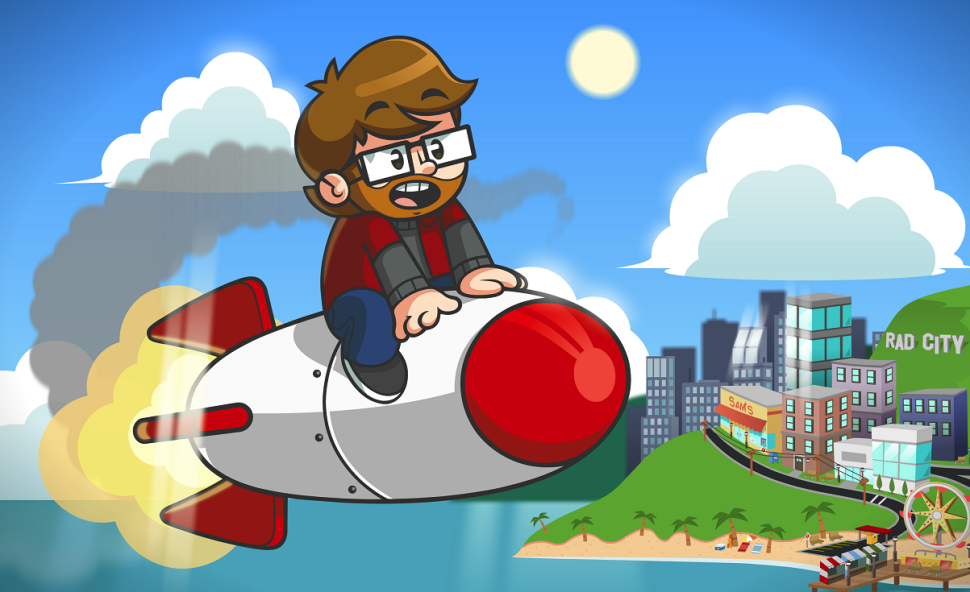
Beesender is a program for automating communication with employees and customers using instant messengers, social networks and chatbots. In MEGA, on its basis a comprehensive solution was created for training and monitoring knowledge in the field of security.
All new employees, contractors and tenants of MEGA must undergo a safety briefing and then pass testing on it with a certain frequency. These people, of course, a lot. Since these briefings are mandatory, they need to be regularly organized, accountable for them and monitored deadlines.
')
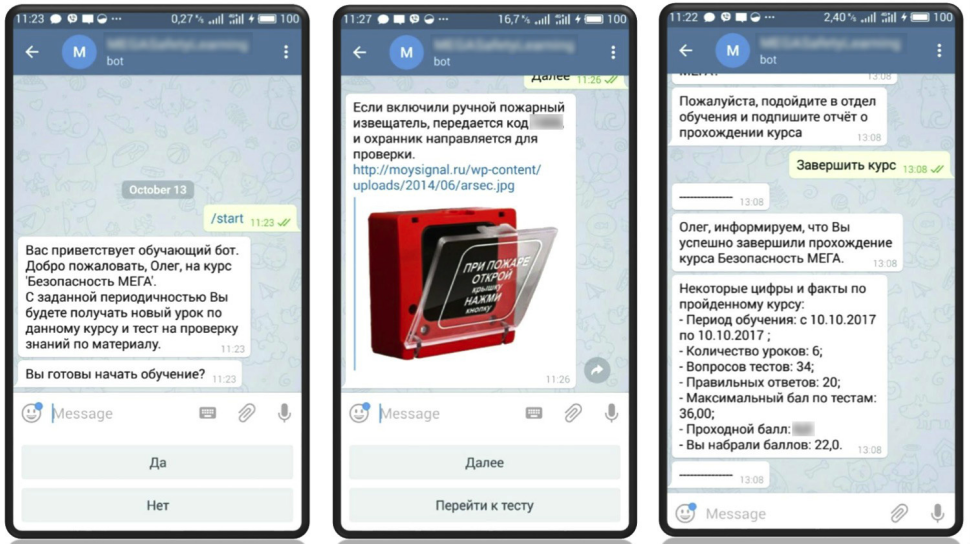
Beesender automated these briefings and testing - now you can take them at any time using the chatbot in Facebook, Telegram or in a web browser. Notifications of deadlines come to the mail or to the phone. All information about passing courses is reduced to the admin panel, with which it is easy to generate reports.

During the pilot implementation, 68 people passed and passed a course on safety through Beesender. Almost everyone liked the speed and availability of the system.
Automation of instruc- tions using software allows you to significantly optimize the process over time: you do not need to wait for a group to complete the course; Simplified screening of dismissed employees: they do not receive alerts about the course - they do not pass the test on time - the passes are automatically disabled. Another point is the convenience of setting up new courses and reporting, which is very important when all tenants and contractors pass the course, as is the case with security. Finally, the costs of instructors and other staff serving internal training are reduced.
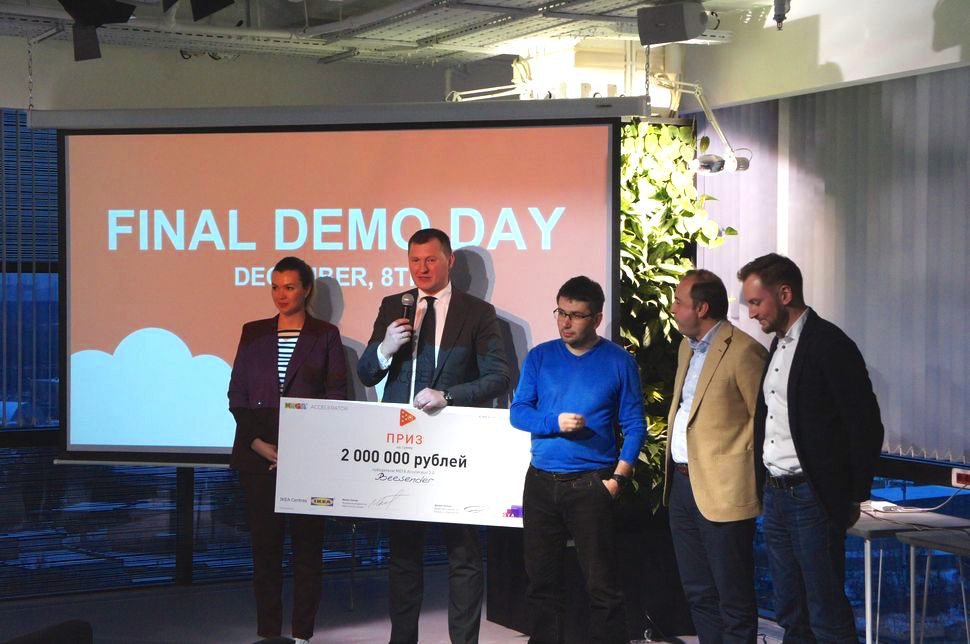
Beesender won the second MEGA Accelerator and received a prize of 2 million rubles.
You can read about how the MEGA security system is organized in the “behind the scenes” review of MEGA Belaya Dacha.
The second project also uses chatbots, but has a different functionality. Its main task is the unification of the entire interaction between the administration of the shopping complex and tenants. Usually, it is accompanied by a large amount of paperwork: often both sides have to send each other paper letters and notifications, and large-scale work on surveying tenants is carried out by courier service and therefore lingers over time.
MrBot is able to automate these processes: organize technical correspondence, send notifications and collect feedback in electronic form, carry out formalized requests (for example, for a pass). All this can be integrated through social networks, instant messengers and other convenient means of communication. An additional bonus is personalization: you can make individual offers to the client based on the information collected on it.
The main feature of the bot is its ability to learn in natural language in the process of working, to isolate the meaningful essence of the messages.
During the test implementation, a part of the tool's functionality was implemented in MEGA: opinions and proposals of tenants were collected and then automatically analyzed.
Verme system is designed to calculate the store's need for sales staff. It takes huge amounts of data for a period of up to 4 years - scans, checks, information from warehouses, etc. - normalizes them, takes into account seasonality and periodic promotions, and then, based on the results of the analysis, gives out a forecast with a resolution from 15 minutes to 1 day.
As part of a pilot project, the system was implemented at 40 MEGA Khimki ticket offices. The results were interesting. The costs for staff planning during this period were reduced from 63 to 7 hours. And the potential savings in payroll for the year is $ 23 million.
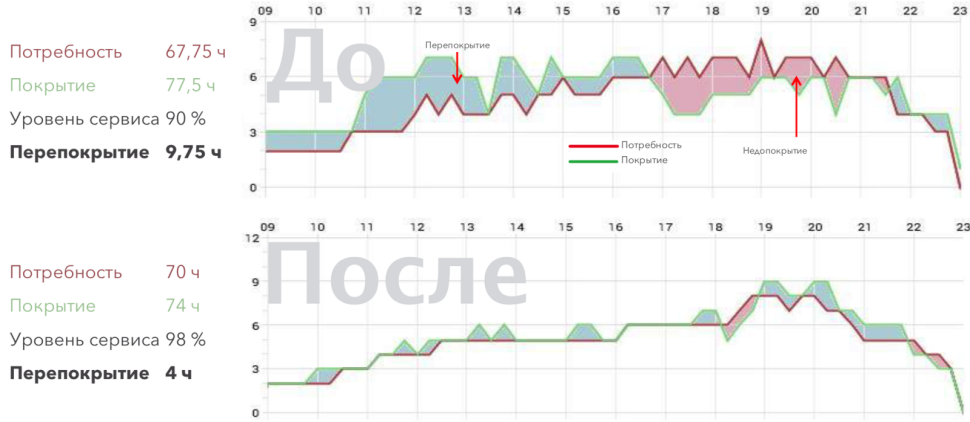
Above are the schedules of work of cash registers for the working day before and after system implementation In general, the number of extra hours, when the cashier is present at the workplace, but does not serve anyone, decreased by 5%. An additional effect is that, thanks to Verme, the level of service has increased: queues have shrunk and customer impressions have improved.
The virtual reality planetarium Altair VR was installed in one of the MEGA hypermarkets for nine days. Under the domed stylized theme of the New Year, you could watch VR films about space.

Due to the large number of approvals, the pilot phase of the project lasted only a week. During this time, the planetarium was visited by 213 people, and only 20% of them are adults. According to the polls, 96% of the guests liked the planetarium, and 87% would like to come again.
Faith is a robot recruiter who interacts with job candidates. As part of the robot pilot used in MEGA, and IKEA.
In MEGA, Vera started looking for an on-duty engineer for one of the hypermarkets. As a priority criterion, relevant work experience was indicated. The robot conducted an interview with 71 candidates out of 118 and selected the 10 most suitable, transferring them to live recruiters. Interestingly, in the future, the hiring service approved several people and hired them.
The second task of the Faith was a cold, “outgoing” search for candidates for work. Vera made 2,607 calls, which resulted in 102 responses and 34 invitations for an interview. It took 26 hours, or 3.5 business days. A live recruiter would take so much more time — 81 days.
The organizers feared that people during telephone interviews would refuse to talk to the robot, and their answers would not be sufficiently clear or structured for Vera to be able to extract the necessary data. Fortunately, the fears were not confirmed.
Collaboration with the developers continues. Now they analyze the standard reasons for the refusal of candidates at the initial interview and teach Faith to answer the questions of applicants. And they are refining the AI for prescoring the incoming stream.
This is another project aimed not at optimizing internal processes, but at working with visitors. The Save Time app allows you to pre-order food and services in establishments located in a shopping center. So visitors can plan ahead, for example, visiting a beautician and not losing time waiting for orders at restaurants - as soon as dishes are ready, they will receive a notification on a smartphone.
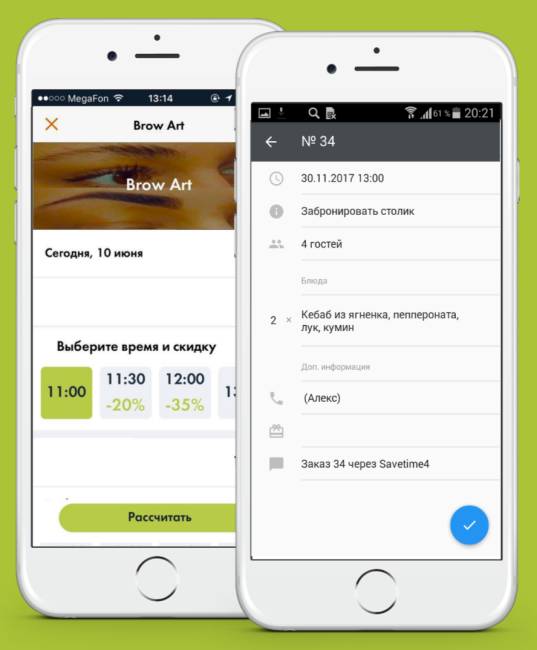
According to the results of the pilot, 12 of 26 restaurants already cooperate with developers in one of the shopping centers, another eight are at the coordination stage. In the future, the developers plan to integrate the product with the site and the MEGA application, add profitable promotions for users and expand the functionality of the application.
This Israeli company presented its project via video link from San Francisco. The essence of Hexa is that the platform allows you to create a 3D model of a thing (for example, a blouse), after which it can be virtually viewed and even “tried on”. And only then come to the store with specific articles, or even order everything via the Internet. In stores where this technology has been implemented in a test mode, it is actively used by customers and find it convenient.

Beesender - MEGA Accelerator winner
Beesender is a program for automating communication with employees and customers using instant messengers, social networks and chatbots. In MEGA, on its basis a comprehensive solution was created for training and monitoring knowledge in the field of security.
All new employees, contractors and tenants of MEGA must undergo a safety briefing and then pass testing on it with a certain frequency. These people, of course, a lot. Since these briefings are mandatory, they need to be regularly organized, accountable for them and monitored deadlines.
')

Beesender automated these briefings and testing - now you can take them at any time using the chatbot in Facebook, Telegram or in a web browser. Notifications of deadlines come to the mail or to the phone. All information about passing courses is reduced to the admin panel, with which it is easy to generate reports.

During the pilot implementation, 68 people passed and passed a course on safety through Beesender. Almost everyone liked the speed and availability of the system.
Automation of instruc- tions using software allows you to significantly optimize the process over time: you do not need to wait for a group to complete the course; Simplified screening of dismissed employees: they do not receive alerts about the course - they do not pass the test on time - the passes are automatically disabled. Another point is the convenience of setting up new courses and reporting, which is very important when all tenants and contractors pass the course, as is the case with security. Finally, the costs of instructors and other staff serving internal training are reduced.

Beesender won the second MEGA Accelerator and received a prize of 2 million rubles.
You can read about how the MEGA security system is organized in the “behind the scenes” review of MEGA Belaya Dacha.
MrBot - became a messenger for tenants
The second project also uses chatbots, but has a different functionality. Its main task is the unification of the entire interaction between the administration of the shopping complex and tenants. Usually, it is accompanied by a large amount of paperwork: often both sides have to send each other paper letters and notifications, and large-scale work on surveying tenants is carried out by courier service and therefore lingers over time.
MrBot is able to automate these processes: organize technical correspondence, send notifications and collect feedback in electronic form, carry out formalized requests (for example, for a pass). All this can be integrated through social networks, instant messengers and other convenient means of communication. An additional bonus is personalization: you can make individual offers to the client based on the information collected on it.
The main feature of the bot is its ability to learn in natural language in the process of working, to isolate the meaningful essence of the messages.
During the test implementation, a part of the tool's functionality was implemented in MEGA: opinions and proposals of tenants were collected and then automatically analyzed.
Verme - save 23 million per year
Verme system is designed to calculate the store's need for sales staff. It takes huge amounts of data for a period of up to 4 years - scans, checks, information from warehouses, etc. - normalizes them, takes into account seasonality and periodic promotions, and then, based on the results of the analysis, gives out a forecast with a resolution from 15 minutes to 1 day.
As part of a pilot project, the system was implemented at 40 MEGA Khimki ticket offices. The results were interesting. The costs for staff planning during this period were reduced from 63 to 7 hours. And the potential savings in payroll for the year is $ 23 million.

Above are the schedules of work of cash registers for the working day before and after system implementation In general, the number of extra hours, when the cashier is present at the workplace, but does not serve anyone, decreased by 5%. An additional effect is that, thanks to Verme, the level of service has increased: queues have shrunk and customer impressions have improved.
Altair VR - 213 visitors per week
The virtual reality planetarium Altair VR was installed in one of the MEGA hypermarkets for nine days. Under the domed stylized theme of the New Year, you could watch VR films about space.

Due to the large number of approvals, the pilot phase of the project lasted only a week. During this time, the planetarium was visited by 213 people, and only 20% of them are adults. According to the polls, 96% of the guests liked the planetarium, and 87% would like to come again.
Robot Vera - 2607 calls in 26 hours
Faith is a robot recruiter who interacts with job candidates. As part of the robot pilot used in MEGA, and IKEA.
In MEGA, Vera started looking for an on-duty engineer for one of the hypermarkets. As a priority criterion, relevant work experience was indicated. The robot conducted an interview with 71 candidates out of 118 and selected the 10 most suitable, transferring them to live recruiters. Interestingly, in the future, the hiring service approved several people and hired them.
The second task of the Faith was a cold, “outgoing” search for candidates for work. Vera made 2,607 calls, which resulted in 102 responses and 34 invitations for an interview. It took 26 hours, or 3.5 business days. A live recruiter would take so much more time — 81 days.
The organizers feared that people during telephone interviews would refuse to talk to the robot, and their answers would not be sufficiently clear or structured for Vera to be able to extract the necessary data. Fortunately, the fears were not confirmed.
Collaboration with the developers continues. Now they analyze the standard reasons for the refusal of candidates at the initial interview and teach Faith to answer the questions of applicants. And they are refining the AI for prescoring the incoming stream.
Save Time - half of the restaurants with pre-order
This is another project aimed not at optimizing internal processes, but at working with visitors. The Save Time app allows you to pre-order food and services in establishments located in a shopping center. So visitors can plan ahead, for example, visiting a beautician and not losing time waiting for orders at restaurants - as soon as dishes are ready, they will receive a notification on a smartphone.

According to the results of the pilot, 12 of 26 restaurants already cooperate with developers in one of the shopping centers, another eight are at the coordination stage. In the future, the developers plan to integrate the product with the site and the MEGA application, add profitable promotions for users and expand the functionality of the application.
Hexa - everyone wants to try on AR
This Israeli company presented its project via video link from San Francisco. The essence of Hexa is that the platform allows you to create a 3D model of a thing (for example, a blouse), after which it can be virtually viewed and even “tried on”. And only then come to the store with specific articles, or even order everything via the Internet. In stores where this technology has been implemented in a test mode, it is actively used by customers and find it convenient.
Source: https://habr.com/ru/post/347830/
All Articles